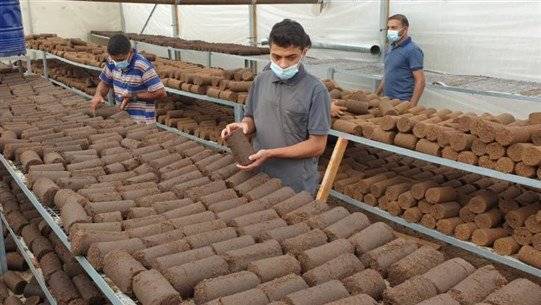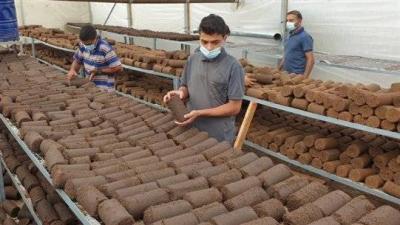The demand for olive pomace has increased as an alternative to firewood in winter. Many residents of Nabatiyeh, Marjeyoun, and villages along the border have started to stockpile it after the price of a canister of diesel reached nearly 900,000 Lebanese Lira, and the price of firewood climbed to 120 dollars per meter. Typically, olive farmers would leave the pomace at the press, as it had no value, but the economic crisis has compelled people to use it for heating purposes, which has raised its price, although it remains relatively acceptable compared to firewood and diesel prices. Pomace is sold either "pressed," with pieces at 2,000 Lira each, or "loose," at 5,000 Lira per kilogram. Abu Jirjis, a resident of the southern town of Qlay'a, finds the cost acceptable, especially since there is no possibility to buy a meter of firewood for 120 dollars. A citizen needs 3 to 4 meters of firewood in winter, costing around 450 dollars, while the cost of olive pomace does not exceed 100 dollars at most.
"Who will buy diesel?" This material, which was the main heating source about two years ago, has now become unaffordable for a large segment of the population, forcing them to look for alternatives. The first option chosen was olive pomace. In front of his house in Marjeyoun, Karam Allah lays out olive pomace to dry, after buying more than four barrels, each capable of holding 25 kg, which is enough for him to heat his home and light his stove throughout the winter, reducing the overall costs of firewood, electricity, and diesel.
Families are currently racing to secure olive pomace, which is extracted after pressing olives, and it has become an important heating source these days, turning it into a profitable trade for many. This industry has become a primary source of work for Yusuf and his children for about two years now; he purchased a press for this purpose and has started converting pomace into firewood, confirming that "demand has doubled compared to last year due to people's inability to buy firewood and diesel." He stated that pomace "used to supplement firewood for heating, but the economic crisis has made it a basic necessity with no alternative, and its production is inexpensive, making it one of the most profitable."
Many olive farmers require the press owner to take the pomace resulting from their olive pressing, especially since some presses stipulate that farmers take it in exchange for reducing the cost of pressing olives as a trade-off. In his recent visit to Deir Mimas, the town famous for olive cultivation, Environment Minister Nasser Yassin emphasized supporting the development of the olive pomace industry as an environmentally friendly industry that helps reduce the cutting of trees in nature reserves and forests. Yusuf and many others hope for support to develop this industry, which in the foreseeable future will become one of the most important alternative heating industries.
Citizens face a critical crossroads as winter approaches: either endure the cold or rely on olive pomace, as diesel and firewood have become accessible only to those who can afford them. The crisis has exposed people's vulnerabilities, pushing them to seek alternatives that were nearly nonexistent in trade just two years ago.




